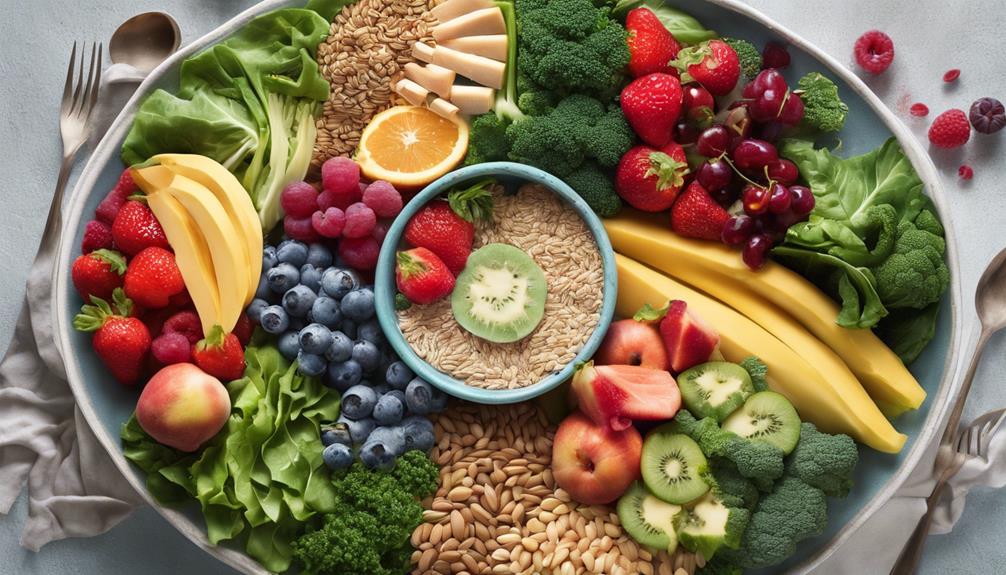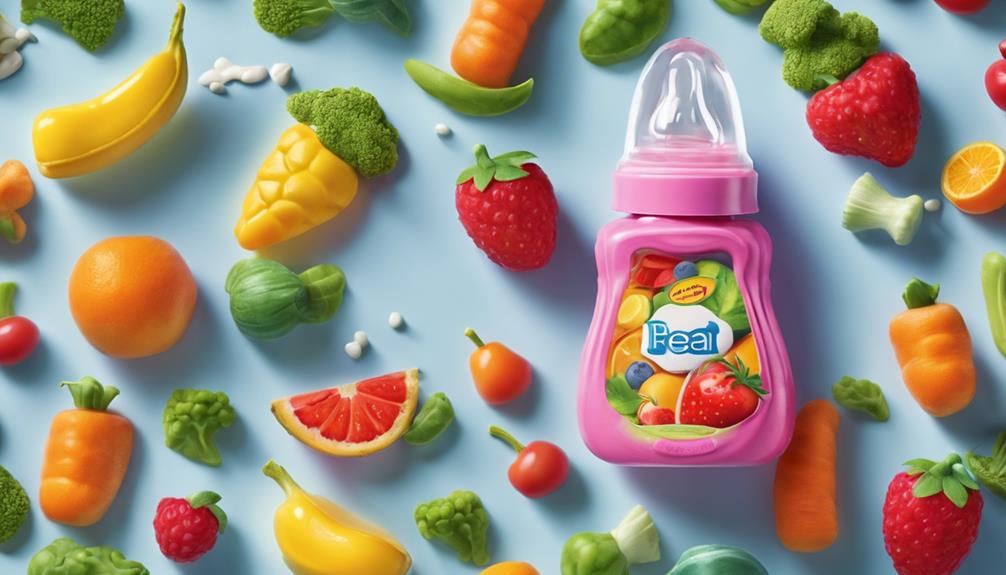As new moms, we may not fully grasp the intricate link between our diet and breastfeeding. Did you know that the food we eat can have a big impact on the amount and quality of our breast milk?
Understanding the essential breastfeeding diet guide is not just about what to eat but also what to avoid to guarantee the best nourishment for our little ones.
Stick around to uncover the key nutrients vital for milk production and discover the foods that can help boost your milk supply effortlessly.
Key Takeaways
- Proper nutrition supports milk production and maternal health.
- Include protein, Omega-3, calcium, and iron-rich foods in diet.
- Choose galactagogues and nutrient-dense foods to boost milk supply.
- Consult healthcare providers for personalized nutritional guidance.
Importance of Nutrition for Breastfeeding Moms
Proper nutrition plays an important role in supporting the health of breastfeeding moms and meeting the increased energy demands of milk production. Breastfeeding requires an additional 330 to 400 calories per day to guarantee an adequate milk supply, making it essential for moms to focus on nutrient-rich foods. Including a variety of protein-rich foods, such as lean meats, eggs, legumes, and dairy, can help with milk production and maternal health. Whole grains like oats and brown rice, along with plenty of fruits and vegetables, provide essential vitamins and minerals necessary for both the mother and the baby during breastfeeding.
Maintaining a well-rounded diet not only supports the growth and development of the breastfeeding baby but also aids in replenishing maternal stores depleted during pregnancy and childbirth. Consulting with a healthcare provider can offer personalized guidance on specific nutritional needs and address any deficiencies that may arise while breastfeeding. Remember, a balanced and nutritious diet is key to supporting both maternal health and successful breastfeeding.
Key Nutrients for Breast Milk Production

Ensuring an adequate intake of key nutrients is essential for supporting excellent breast milk production and the overall health of both mother and baby. To optimize breast milk production, it's important to focus on the following key nutrients:
- Protein: Incorporate lean meats, poultry, fish, eggs, dairy products, beans, nuts, and seeds into your diet to provide the necessary building blocks for breast milk production.
- Omega-3 Fatty Acids**: Enhance the quality of your breast milk by including healthy fats like omega-3 fatty acids from fish in your meals.
- Calcium: Maintain bone health and support milk production by consuming calcium-rich foods such as dairy products, leafy greens, and fortified foods.
- Iron**: Ensure you and your baby get enough iron by including sources like lean meats, beans, fortified cereals, and dark leafy greens in your diet.
Remember to also consider your Vitamin D intake, as it plays an important role in calcium absorption and bone health. Incorporate fortified milk, eggs, and fatty fish into your meal plan or consult with your healthcare provider about supplements to meet your needs.
Foods to Boost Milk Supply
To optimize breast milk production, incorporating specific foods known as galactagogues can help boost milk supply for new moms. Oatmeal, fenugreek, and brewer's yeast are well-known galactagogues that have been shown to increase milk production. Including foods rich in omega-3 fatty acids like salmon, chia seeds, and walnuts can also support milk production.
Additionally, dark leafy greens such as spinach and kale are high in iron, which is important for maintaining milk supply. To make sure you're getting essential nutrients like calcium and protein, consider consuming almonds, cashews, and sesame seeds.
In addition, adding fennel, garlic, and carrots to your diet may help enhance both milk production and quality. By incorporating these foods rich in galactagogues, omega-3 fatty acids, iron, calcium, protein, and essential nutrients into your diet, you can effectively boost your milk supply and provide your baby with the nourishment they need.
Nutritional Tips for New Moms

When nurturing their newborns, new moms can enhance their well-being and support milk production by focusing on nutrient-rich foods. Here are some essential nutritional tips for new moms:
- Choose Protein-Rich Foods: Incorporate lean meat, eggs, dairy, beans, and seafood into your meals to support muscle repair and growth.
- Opt for Whole Grains: Select whole-grain bread, brown rice, and oats to boost your fiber intake and provide sustained energy throughout the day.
- Include Fruits and Vegetables: Load up on a variety of colorful fruits and vegetables to make certain you're getting a wide range of vitamins, minerals, and antioxidants.
- Consider Supplements: Talk to your healthcare provider about a daily multivitamin and mineral supplement to fill any nutritional gaps and support your overall well-being.
Foods to Limit or Avoid While Breastfeeding
We can enhance the well-being of both the mother and the baby by being mindful of foods to limit or avoid while breastfeeding. It is essential to avoid alcohol entirely as even small amounts in breast milk can be harmful to the baby. Limiting caffeine intake to 2-3 cups per day can help prevent potential agitation in your baby due to caffeine transfer through breast milk. Additionally, be cautious of seafood high in mercury like shark, swordfish, king mackerel, and tilefish to steer clear of risks to the baby's developing nervous system. Monitor your diet for any foods that may cause irritability or allergic reactions in your baby, and consult your healthcare provider if needed. Avoiding foods that could trigger allergic reactions is key, and observing changes in your baby's behavior after eliminating suspected foods for a week can help identify potential triggers.
| Foods to Limit or Avoid | Reasons | Recommendations |
|---|---|---|
| Alcohol | Unsafe for the baby's health | Avoid completely |
| Caffeine | May cause agitation in the baby | Limit to 2-3 cups/day |
| Seafood high in mercury | Risks to the baby's developing nervous system | Avoid shark, swordfish, king mackerel, tilefish |
| Allergic reaction triggers | Potential irritability or allergic reactions in the baby | Monitor diet, consult healthcare provider |
Frequently Asked Questions
What Food Should a New Lactating Mother Have?
We focus on nourishing foods for best milk production. Lean protein, whole grains, colorful veggies, and fruits are key. Hydration is essential. Prioritize foods that boost energy, provide nutrients, and support milk supply for new moms.
What Are the Dietary Requirements for Breastfeeding?
We should focus on nutrient-rich foods like whole grains, lean protein, fruits, and veggies to meet the dietary needs while breastfeeding. Hydration is key, so drink water and avoid sugary beverages. Staying healthy is crucial for both mom and baby.
What Does a New Mom Need for Breastfeeding?
For breastfeeding, new moms need an extra 330 to 400 calories daily. We should focus on nutrient-rich options like whole grains, lean protein, fruits, and veggies. Protein sources such as lean meat, dairy, beans, and seafood are essential.
What Are Three Nutrition Guidelines for a New Mother?
We focus on consuming extra calories daily, choose nutrient-dense foods, and stay hydrated. These guidelines support milk production and overall well-being. It's important to consult healthcare providers for personalized postpartum dietary advice.
Conclusion
In the journey of breastfeeding, our bodies are like gardens that require careful tending and nourishment to yield the best results.
Just as a gardener chooses the right nutrients and care for their plants, new moms must prioritize their own well-being through a balanced diet rich in key nutrients.
By cultivating this essential breastfeeding diet, we can guarantee a bountiful harvest of health and vitality for both ourselves and our precious little ones.









